Welcome to the Amira-Avizo Software Use Case Gallery
Below you will find a collection of use cases of our 3D data visualization and analysis software. These use cases include scientific publications, articles, papers, posters, presentations or even videos that show how Amira-Avizo Software is used to address various scientific and industrial research topics.
Use the Domain selector to filter by main application area, and use the Search box to enter keywords related to specific topics you are interested in.

The behavior of loess is controlled by its microstructure, consisting of silt sized skeleton particles and complex bonding structures formed by clay-sized particles. Achieving a deep understanding and precise modelling of loess behavior necessitates comprehensive knowledge of the realistic 3D microstructure.
- Innovative 3D analysis of loess microstructure using μXCT and FIB-SEM.
- Detailed visualizat... Read more
B. Yu, T.A. Dijkstra, W. Fan, I.J. Smalley, Y.N. Wei, L.S. Deng
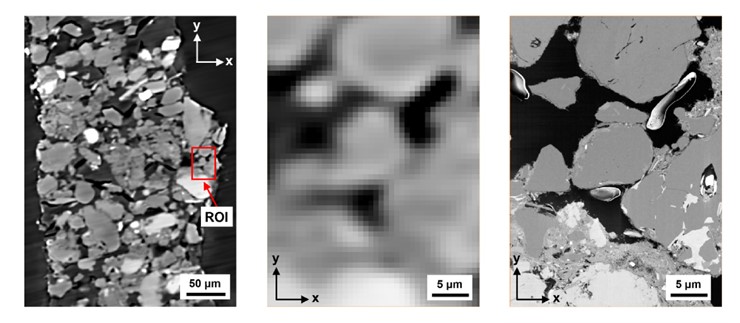
3D loess microstructure of loess, including skeleton particles as well as inter-particle bonding structures, was characterized through a correlative approach using μXCT and FIB-SEM
Loess, a Quaternary wind-blown deposit, is a problem soil that gives rise to frequent geohazards such as landslides and water-induced subsidence. The behavior of loess is controlled by its microstructure, consisting of silt sized
skeleton particles and complex bonding structures formed by clay-sized p... Read more
B. Yu, T.A. Dijkstra, W. Fan, I.J. Smalley, Y.N. Wei, L.S. Deng
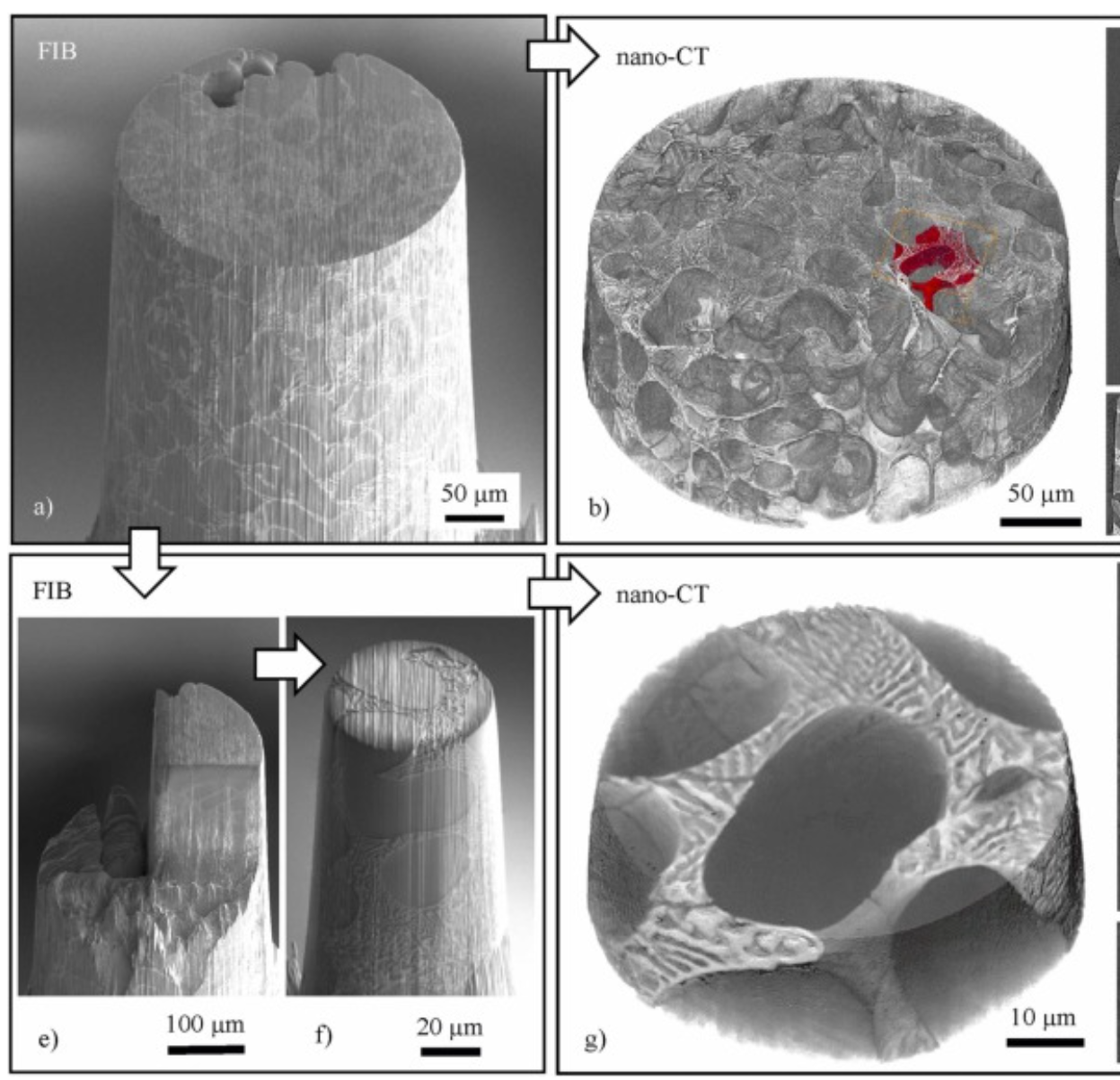
Three-dimensional imaging of microstructural evolution in SEM-based nano-CT
Scanning electron microscopy (SEM) is a powerful and versatile technique for materials characterization and present in many laboratories. The integration of an X-ray target holder and detector allows expanding the modalities of SEM by X-ray imaging. These little hardware adaptations enable radiography ... Read more
Jonas Fell, Christoph Pauly, Michael Maisl, Simon Zabler, Frank Mücklich, Hans-Georg Herrmann
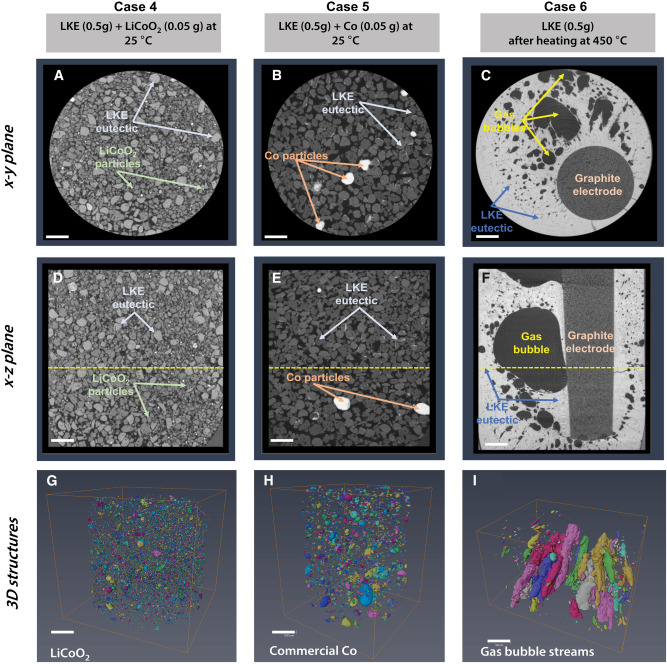
Recycling spent lithium-ion batteries (LiBs) guarantees the conservation of important metal resources by reducing demands on raw supply and offsetting the energy and environmental costs associated with its manufacture. Employing a molten salt as a solvent for extraction affords a much greener and simpler route to metal recovery by electrochemical means. The current mechanistic understanding of the electrochemical recovery of metals in molten salts needs to be improved for the process to be op... Read more
Mateen Mirza, Wenjia Du, Lara Rasha, Steven Wilcock, Arfon H. Jones, Paul R. Shearing, Dan J.L. Brett
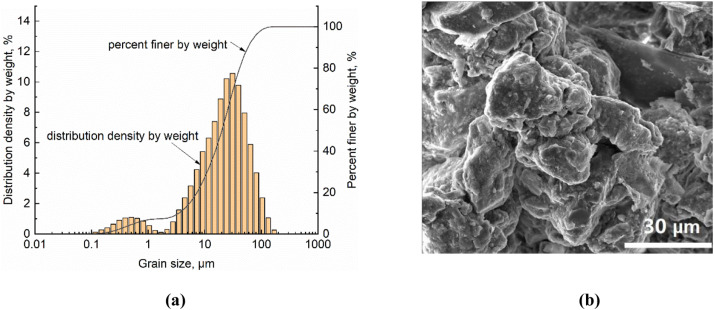
3D characterisation of the particle kinematics during loess collapse is performed based on X-ray micro-computed tomography.
Particle displacements and rotations associated with the collapse are determined.
The volumetric strain is shown to be significantly heterogeneous at single-particle scale.
The evolution of particle-to-particle contacts is found to be much more complex than previously stated.
An apparatus is specially designed to perf... Read more
B. Yu, W. Fan, J.H. Fan, T.A. Dijkstra, Y.N. Wei, T.T. Wei
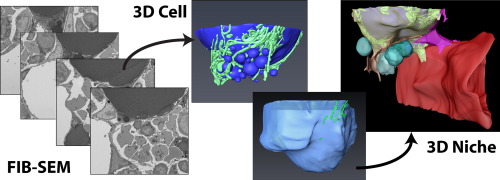
Characterization of the bone marrow adipocyte niche with three-dimensional electron microscopy
Unlike white and brown adipose tissues, the bone marrow adipocyte (BMA) exists in a microenvironment containing unique populations of hematopoietic and skeletal cells.
To study this microenvironment at the subcellular level, we performed a three-dimensional analysis of the ultrastructure of the BMA niche with focused ion beam scanning electron microscopy (FIB-SEM). This revealed that BMAs display hallmarks of metabolically active cells including polarized lipid deposits, a dense mitoch... Read more
Hero Robles, SungJae Park, Matthew S. Joens, James A.J. Fitzpatrick, Clarissa S. Craft, Erica L. Scheller
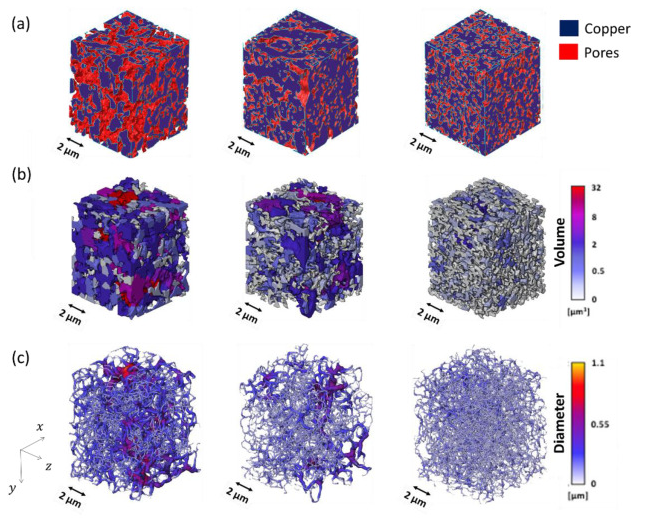
Porous materials have attracted great attention for various applications, e.g., catalysis, novel materials, energy related topics, acoustics, microelectronics, actuator, bioengineering and biomimetic. Recently, porous materials have gained interest as interconnect materials for power semiconductor device.
The trend in the semiconductor industry goes towards eco-friendliness and higher energy efficiency. Semiconductor compound materials, such as silicon carbide (SiC) or gallium nitride... Read more
A.Wijaya, B.Eichinger, F.F.Chamasemani, B.Sartory, R.Hammer, V.Maier-Kiener, D.Kiener, M.Mischitz, R.Brunner
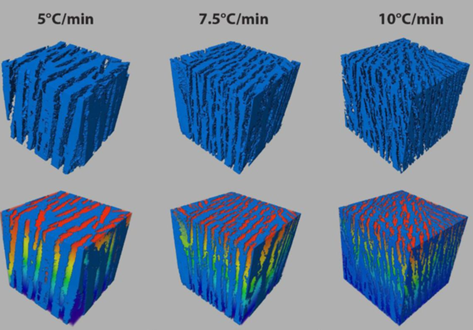
The prevailing electrode fabrication method for lithium-ion battery electrodes includes calendering at high pressures to densify the electrode and promote adhesion to the metal current collector.
However, this process increases the tortuosity of the pore network in the primary transport direction and imposes severe tradeoffs between electrode thickness and rate capability. With the aim of understanding the impact of pore tortuosity on electrode kinetics, and enabling cell designs with ... Read more
Benjamin Delattre, Ruhul Amin, Jonathan Sander, Joël De Coninck, Antoni P. Tomsia and Yet-Ming Chiang
Cryo-STEM mapping of solid–liquid interfaces and dendrites in lithium-metal batteries
Solid–liquid interfaces are important in a range of chemical, physical and biological processes but are often not fully understood owing to the lack of high-resolution characterization methods that are compatible with both solid and liquid components. For example, the related processes of dendritic deposition of lithium metal and the formation of solid–electrolyte interphase layers are known to be key determinants of battery safety and performance in high-energy-density lithium-metal bat... Read more
Michael J. Zachman, Zhengyuan Tu, Snehashis Choudhury, Lynden A. Archer & Lena F. Kourkoutis
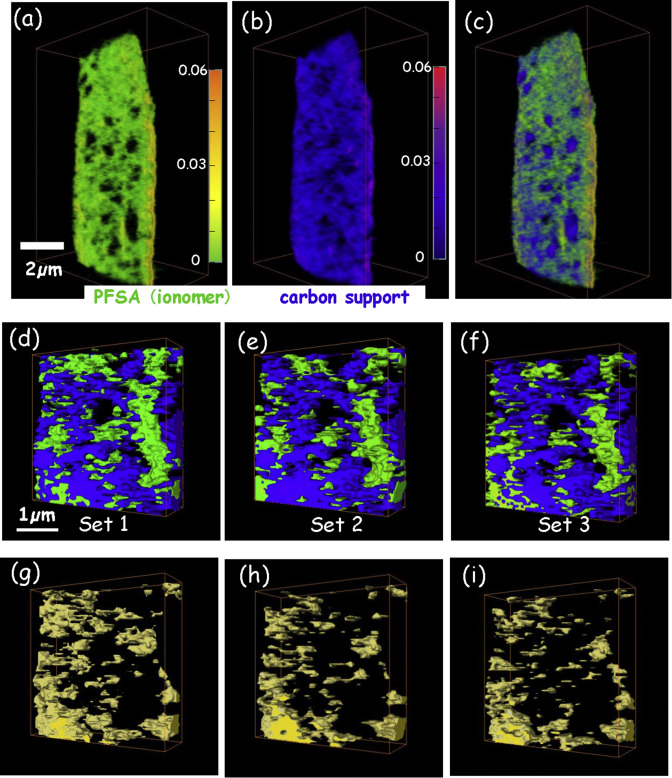
4D imaging – the three-dimensional distributions of chemical species determined using multi-energy X-ray tomography – of cathode catalyst layers of polymer electrolyte membrane fuel cells (PEM-FC) has been measured by scanning transmission x-ray microscopy (STXM) spectro-tomography at the C 1s and F 1s edges. In order to monitor the effects of radiation damage on the composition and 3D structure of the perfluorosulfonic acid (PFSA) ionomer, the same volume was measu... Read more
Juan Wu, Lis G.A.Melo, Xiaohui Zhu, Marcia M.West, Viatcheslav Berejnov, Darija Susac, Juergen Stumper, Adam P.Hitchcock
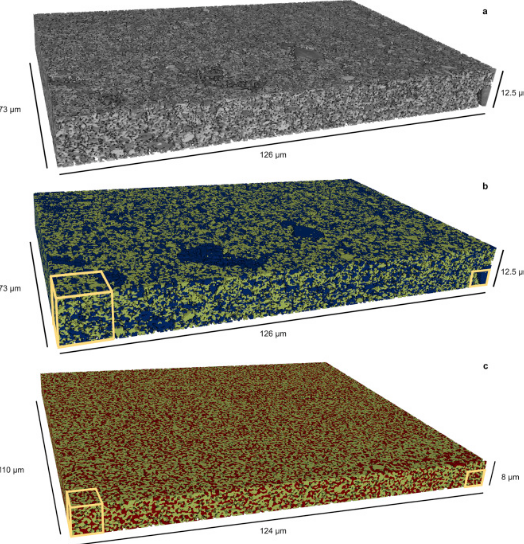
Mesoscale characterization of local property distributions in heterogeneous electrodes
The performance of electrochemical devices depends on the three-dimensional (3D) distributions of microstructural features in their electrodes. Several mature methods exist to characterize 3D microstructures over the microscale (tens of microns), which are useful in understanding homogeneous electrodes. However, methods that capture mesoscale (hundreds of microns) volumes at appropriate resolution (tens of nm) are lacking, though they are needed to understand more common, less ideal electrode... Read more
Tim Hsu, William K. Epting, Rubayyat Mahbub, Noel T. Nuhfer, Sudip Bhattachary, Yinkai Lei, Herbert M. Miller, Paul R. Ohodnicki, Kirk R. Gerdes, Harry W. Abernathy, Gregory A. Hackett, Anthony D. Rollett, Marc De Graef, Shawn Litster, Paul A. Salvador
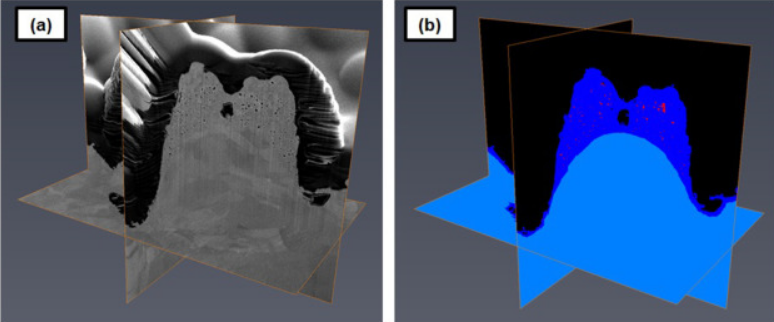
Laser processing of metal surfaces by ultrafast Read more
Edwin Peng, Alexander Roth, Craig A. Zuhlke, Soodabeh Azadehranjbar, Dennis R. Alexander, George Gogos, Jeffrey E. Shield
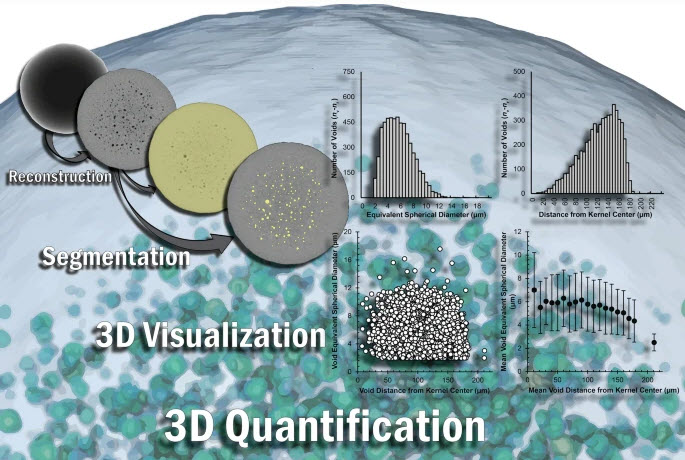
The three-dimensional (3D) characterization of nuclear fuel with X-ray microscopy has historically proven difficult, due to uranium’s high attenuation of easily accessible X-rays, both in a laboratory setting and at a synchrotron user facility. However, this imaging modality provides nondestructive information that can be used to investigate morphological changes arising from external stimuli (e.g., neutron irradiation, high-temperature testing).
Using an appropriate X-ray energy spe... Read more
Nikolaus L. Cordes, William C. Chuirazzi & Joshua J. Kane - John D. Stempien
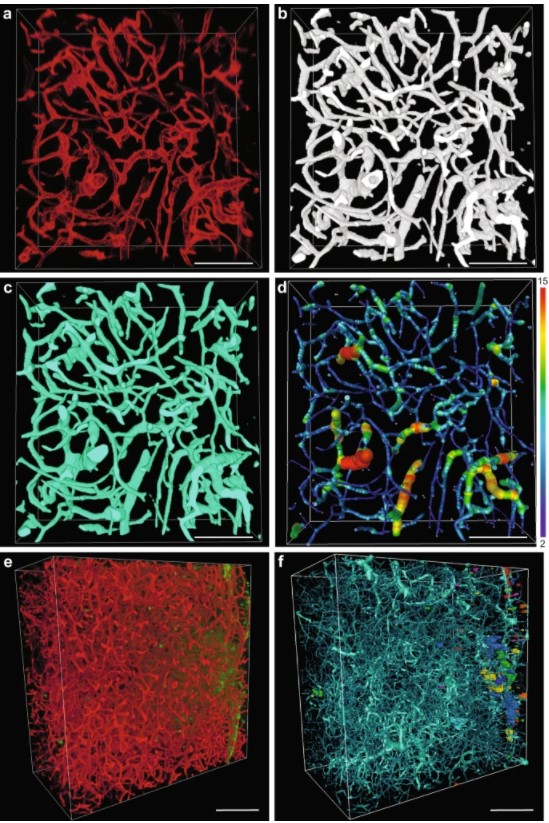
Precise methods for quantifying drug accumulation in brain tissue are currently very limited, challenging the development of new therapeutics for brain disorders. Transcardial perfusion is instrumental for removing the intravascular fraction of an injected compound, thereby allowing for ex vivo assessment of extravasation into the brain. However, pathological remodeling of tissue microenvironment can affect the efficiency of transcardial perfusion, which has been largely overlooked.
We... Read more
Serhii Kostrikov, Kasper B. Johnsen, Thomas H. Braunstein, Johann M. Gudbergsson, Frederikke P. Fliedner, Elisabeth A. A. Obara, Petra Hamerlik, Anders E. Hansen, Andreas Kjaer, Casper Hempel & Thomas L. Andresen
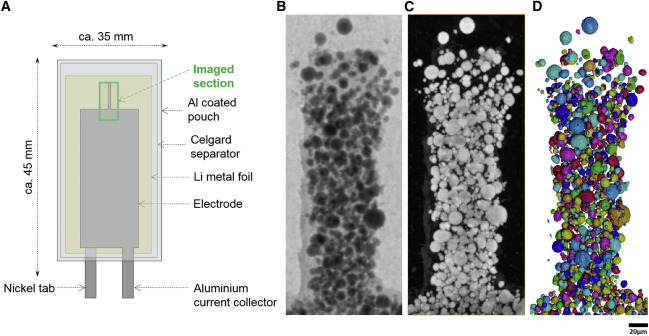
Nickel-rich transition metal oxide materials […] are of great interest for achieving immediate improvements in the energy density of Li-ion batteries and for risk reduction within the Li-ion battery supply chain.
[…] An increase in Ni content in NMC materials leads to accelerated degradation […]. This potentially complicates their adoption in applications requiring extended cycle life such as in electric vehicles.
Recent developments in X-ray characterization to... Read more
ChunTan, Andrew S.Leach, Thomas M.M. Heenan, Huw Parks, Rhodri Jervis, Johanna Nelson Weker, Daniel J.L. Brett, Paul R.Shearing
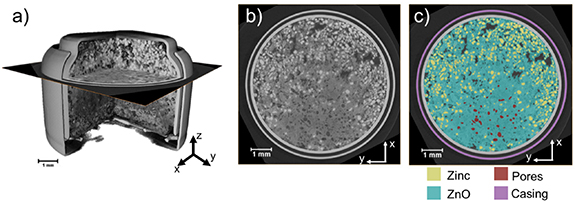
Given the urgent need to move to low-carbon technologies, batteries are being increasingly used in a range of applications. Lithium-ion batteries are the most widely used chemistry, but to meet the growing demand, there is a need to move beyond lithium towards alternative battery chemistries. Metal–air batteries are a group of such battery alternatives that hold promise, especially for stationary power and flexible electronics applications.
However, barriers to their widespread adopt... Read more
Jennifer Hack, Drasti Patel, Josh J Bailey, Francesco Iacoviello, Paul R Shearing, and Dan J L Brett
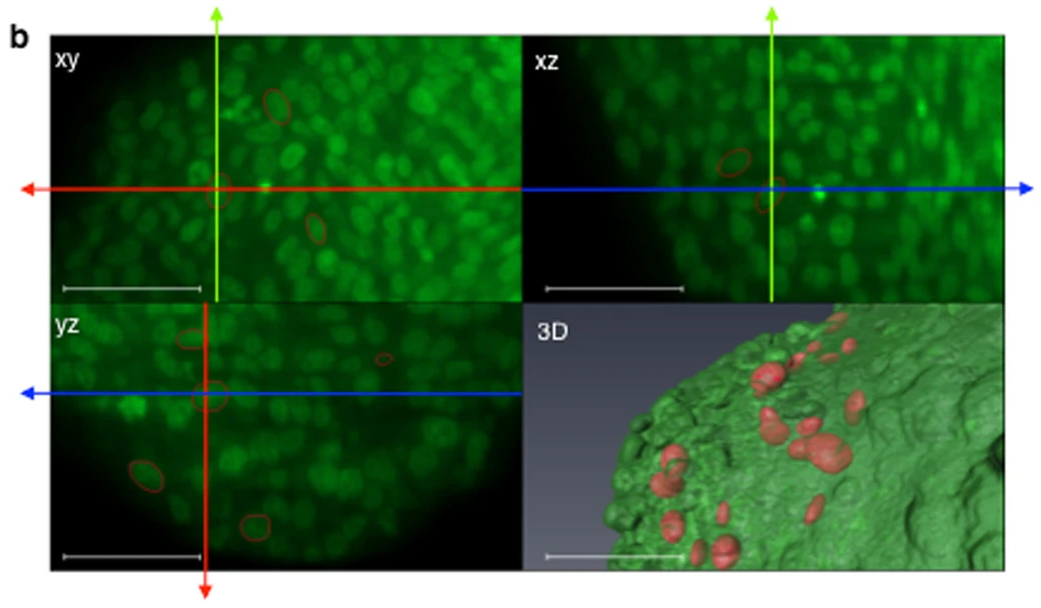
Impact of physical confinement on nuclei geometry and cell division dynamics in 3D spheroids
Multicellular tumour spheroids are used as a culture model to reproduce the 3D architecture, proliferation gradient and cell interactions of a tumour micro-domain. However, their 3D characterization at the cell scale remains challenging due to size and cell density issues. In this study, we developed a methodology based on 3D light sheet fluorescence microscopy (LSFM) image analysis and convex hull calculation that allows characterizing the 3D shape and orientation of cell nuclei relative to ... Read more
Annaïck Desmaison, Ludivine Guillaume, Sarah Triclin, Pierre Weiss, Bernard Ducommun & Valérie Lobjois
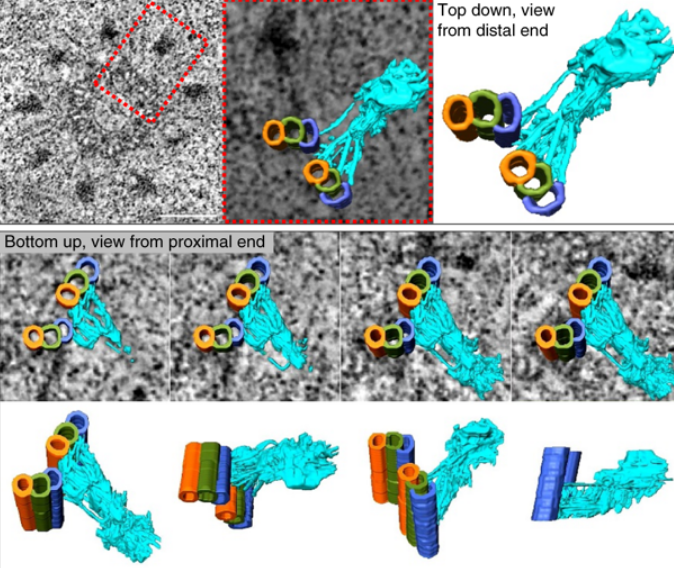
Centrioles are vital cellular structures that form centrosomes and cilia. The formation and function of cilia depends on a set of centriole’s distal appendages. In this study, we use correlative super resolution and electron microscopy to precisely determine where distal appendage proteins localize in relation to the centriole microtubules and appendage electron densities. Here we characterize a novel distal appendage protein ANKRD26 and detail, in high resolution, the initial steps of dist... Read more
Mathew Bowler, Dong Kong, Shufeng Sun, Rashmi Nanjundappa, Lauren Evans, Veronica Farmer, Andrew Holland, Moe R. Mahjoub, Haixin Sui & Jadranka Loncarek
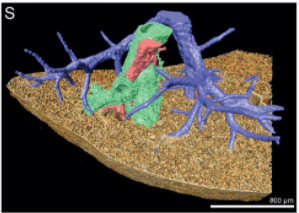
Multiscale Co‐reconstruction of Lung Architectures and Inhalable Materials Spatial Distribution
Pulmonary diseases, such as chronic obstructive pulmonary diseases, lower respiratory infections, and lung cancer are listed in the top ten causes of deaths globally with more than 10 million mortality per year. Apart from oral administration, the Dry Powder Inhalation (DPI) for pulmonary administration provides an important alternative route for targeted treatment of these pulmonary diseases. […] Furthermore, there is a growing demand on und... Read more
Xian Sun, Xiaochuan Zhang, Xiaohong Ren, Hongyu Sun, Li Wu, Caifen Wang, Xiaohui Ye, Peter York, Zhaobing Gao, Hualiang Jiang, Jiwen Zhang, Xianzhen Yin
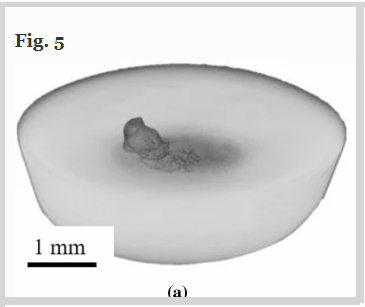
The Spontaneous Emulsification of Entrained Inclusions During Casting of High Aluminum Steels
The cleanliness of liquid steel is defined by the amounts of dissolved unwanted impurities and precipitated unwanted non-metallic phases.[…] Improving the cleanliness of the steel would mean a lower fraction of impurities in the final product. […] A novel approach, utilizing controlled synthetic inclusion/metal samples, has been developed to study the reactions between free inclusion-slag droplets and steel. The technique combines High-Temperature Confocal Scanning Laser Microscop... Read more
Akalya Raviraj, Nadia Kourra, Mark A. Williams, Gert Abbel, Claire Davis, Wouter Tiekink, Seetharaman Sridhar & Stephen Spooner
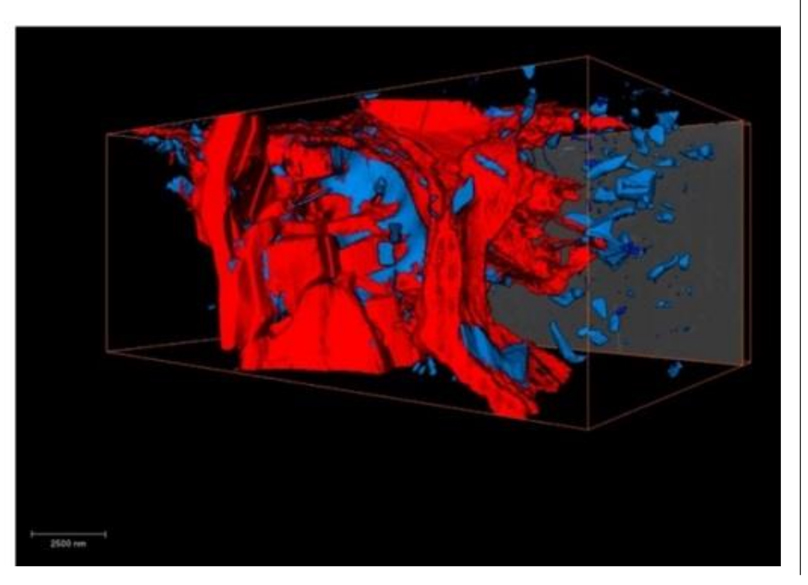
High market demands related to material quality and properties strongly influence redesigning of common safety loaded aluminum alloy castings. The quality of aluminum components and associated obtained mechanical properties are strongly dependent on the casting process and parameters, as well as on the chemical composition. Therefore, the redesigning of chemical composition of high-strength aluminum alloys becomes significant for safety critical structural components in automotive industry.Read more
Davor Stanić, Zdenka Zovko Brodarac, Letian Li